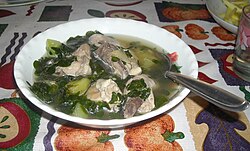Tinola
 A bowl of tinola | |
| Course | Main course |
|---|---|
| Place of origin | Philippines |
| Serving temperature | Hot |
| Main ingredients | Chicken, green papaya, siling labuyo leaves, ginger, onion, fish sauce |
| Variations |
|

Tinola in Tagalog or Visayan, or la uya in Ilocano is a soup-based dish served as an appetizer or main entrée in the Philippines.[1]
Traditionally, this dish is cooked with chicken, wedges of green papaya, and leaves of the siling labuyo chili pepper in broth flavored with ginger, onions and fish sauce. A common variant substitutes fish or pork for chicken, chayote instead of papaya, or with tomatoes and moringa leaves known as marungay or malunggay or kamunggay (in Cebuano), instead of pepper leaves.[2] However, an all-vegetable broth in Cebu with kamunggay in prominence is called utan kamunggay or utan bisayâ, while it is called law-oy in Mindanao and laswa in Hiligaynon. Another variation is Tinolang Tahong, a soup made with mussels, ginger, onion, garlic and bird's eye chili.
The exact origins of Tinola is obscure. One of the earliest mentions of the dish is in José Rizal's first novel, Noli Me Tangere, where Kapitan Tiago served it to Crisostomo Ibarra upon arriving from Europe. He was given the breast, to the dismay of the corrupt Spanish friar, Padre Damaso, who got chicken neck, which is considered to be the least favored chicken part.
See also
References
- ^ "Tinola: A Favorite Philippine Cuisine". Philippines Insider. Retrieved 2010-06-05.
- ^ "Pork tinola". Home Cooking Rocks!. Retrieved 2010-06-05.

